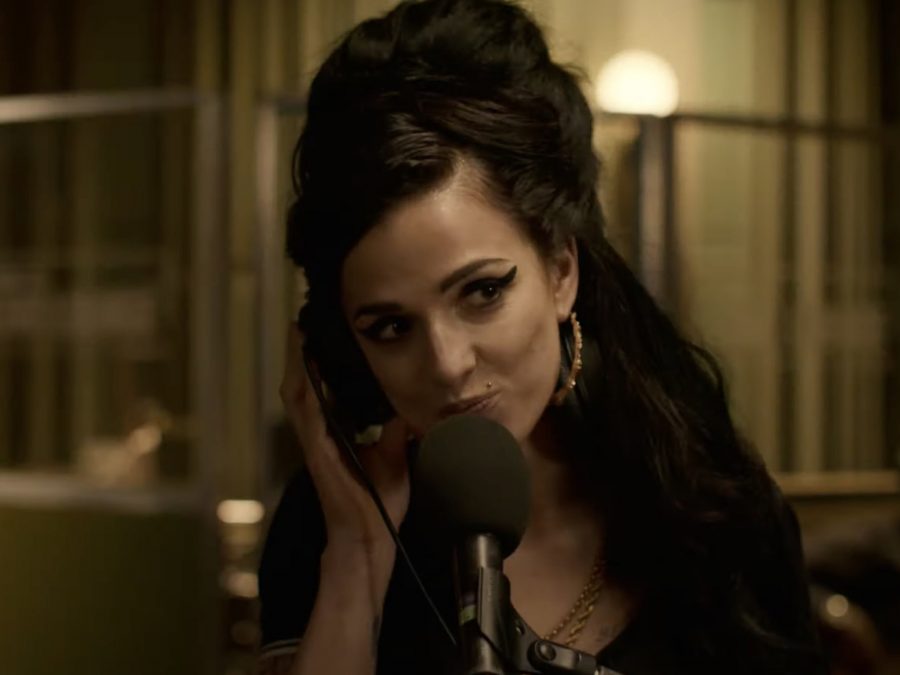This miserable biopic claims to celebrate the life and music of Amy Winehouse, but instead serves as a ghoulish encapsulation of everything wrong with the music industry and fame machine.
Since Bohemian Rhapsody took home four Academy Awards in 2019, it feels as if music biopics have been coming down the slop chute thick and fast, with debates around their ethics, impersonations and omissions becoming ever more tedious. Sam Taylor-Johnson’s Amy Winehouse biopic, Back to Black, might just be the defining stench emanating from the pail.
Industry alum Marisa Abela has the mammoth task of playing Amy, an idol still fresh in the memory of the movie-going population. However, due to the vapid and cruel script by Matthew Greenhalgh (Nowhere Boy, Film Stars Don’t Die in Liverpool), Abela’s primary expressions flit between that of a lovestruck teenager and a bratty, defiant one – without the story ever really acknowledging the tragedy and exploitation of Amy’s youth.
Abela takes the risk of singing in the film, and her impersonation is passable, with the musical interludes offering a brief reprieve from her distractingly overpronounced and uncomfortable North London accent, complete with facial contortions. That being said, considering the film’s many crimes, Abela’s performance comes off as something of a saving grace.
The film spans just under a decade of Amy’s short life, from roughly 18 years old as she works on her debut album Frank, until her premature death at 27. For such an unfortunately short period, it’s a miracle Taylor-Johnson and her collaborators managed to reduce her significant life to even less.
As this film tells it, Amy Winehouse was nothing more than a friendless addict and tabloid joke, desperately following around a hapless loser (Blake Fielder-Civil, played by Jack O’Connell) who drove her to suicide when he moved on and had a child with another woman. In one scene, she runs from her grandmother’s grave to meet her ex at the pub. Runs.
What claims to be the story of the album ‘Back to Black’ is ultimately the story of Amy & Blake, too tepid to be compared to Sid & Nancy, too self-conscious to be compared to Pam & Tommy. Their relationship is briefly bookended by the success of Frank and the period of sobriety before Amy’s death (there is no inclusion of the Lioness album or the Tony Bennett collaboration hinted at in this very film). The manner in which it is depicted is Vaseline-lensed and monotonous, with their extended meeting in a pub depicting Blake introducing Amy to the Shangri-La’s on the jukebox and thus finding her sound for the eponymous album.
As well as crediting Blake with finding Amy’s sound, Taylor-Johnson also goes out of her way to depict Amy’s first time trying hard drugs as an occasion when she’s alone. Back to Black is an excellent alibi for those in Amy’s life who preyed upon her vulnerability and benefitted from her being overworked and exploited.
But strangely for a music biopic, there is no sense of stardom here, with Amy’s charm, wit, and her inability to suffer fools gladly all zapped from this depiction. Her collaborators, most notably Mark Ronson, are practically nonexistent, and the (already well-documented) invasion of paparazzi who tormented her remorselessly feels disconnected from any music success because the film has no real interest in Amy’s artistic process or inspiration.
As much as the party line insists this film is a celebration of Amy’s musical genius, it is as salacious and cruel as any tabloid cutting from the noughties – only invested in the bloody ballet pump left in the street, not the complexities of living a very public life with addiction.

Amy’s love of jazz and beehive hairdos are inherited from her nan Cynthia Winehouse – a phoned-in stock performance from the usually excellent Lesley Manville – whose death is a catalyst for a lot of Amy’s public grief, not that the filmmakers are interested in exploring that grief with any nuance. The rest of the cast, including O’Connell and Eddie Marsan as her apparent superdad Mitch Winehouse, turn in performances that are as uninspired and cheap as the script, while Nick Cave and Warren Ellis’ score adds an aggravating wistfulness to the dire scene.
Bizarre revisions are littered throughout the film, including the omission of the “For my Blake, my Blake incarcerated” line in her iconic Grammy acceptance speech, which is otherwise depicted word for word, as is her full Glastonbury performance where her rendition of ‘Me & Mr Jones’ becomes Me & Blake again – only in the film she doesn’t physically lash out at a fan. While it’s best this particularly fraught moment of Amy’s career was not relit for the big screen, it’s confusing that Taylor-Johnson has no issue with recreating, beat for beat, some of the more desperate tabloid images of Amy’s career, yet draws the line at correctly depicting easily searchable performances.
Amy Winehouse “ain’t no Spice Girl,” and no one can make her “do something she don’t wanna to do,” Abela squawks repeatedly throughout the film. But these aren’t cries for help from a lost young woman, as the film tells it this is the ethos of a powerhouse who was the unstoppable architect of her own misfortune. “Our hands are clean,” the film seems to cry, “All we did was watch!”
Taylor-Johnson has gone on record saying the family had no input in the story and she was unable to meet with Blake prior to filming, as though that gives her project some kind of credence. What it really does is highlight how unduly cruel it is towards the young woman it claims to commemorate. If the Back to Black team were an estate mouthpiece their liberties would at least be explainable.
Even on the most basic level, nothing new can be gleaned about Amy through this film, it’s about as insightful as asking your oldest relative what they remember about her. The worst part is, unlike Blonde or Spencer, Back to Black isn’t designed to be divisive. This is a sincere attempt at memorialising Winehouse in an accessible, mainstream biopic, and its pointless cruelty is nauseating, no matter how unwitting it may be. Amy’s art has always been her best representative. If you wish to know about the pain she felt and to witness her talent as a musician, listen to the album. This film is irredeemable.
Published 9 Apr 2024
Like Marisa Abela, sceptical of an Amy Winehouse biopic.
Bewildered and upset on first watch, bewildered and angry on second watch.
Irredeemable.

Asif Kapadia’s intimate portrait of the late soul singer is too set on driving its own narrative agenda.

The success of films like Elvis and Bohemian Rhapsody prove that there's still a huge appetite among audiences for the familiarity these films offer, particularly in the age of franchise domination.

By Callie Petch
Michael Winterbottom’s portrait of the Madchester scene is enduring proof that films about musicians don’t have to beatify their subjects.